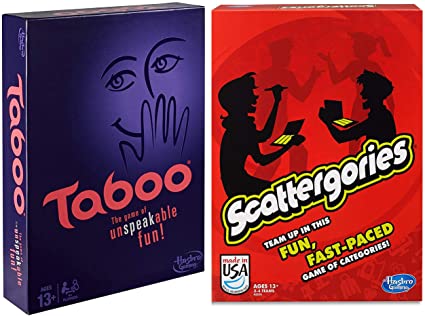
During the past few months, we have been playing several new games during some of our classes here in EP! I would like to introduce two of the games that a lot of you seemed to enjoy. The first one is a game that I introduced back in December of 2020, called “Taboo.” At least four people are required for this game. The game is set up with the total number of players divided into an even or odd number of teams (2 teams of 2 for a four-player game and 3 teams of 2 for a six-player game).
Each team is given a set of cards with a word that needs to be guessed and a list of “taboo” words that can’t be used by whoever is providing hints to the guesser. A timer of one minute is set as soon as the person giving hints starts talking. When a team guesses the correct word, a point is awarded and the team may proceed to the next card. However, if a player accidentally says a taboo word, a point is reduced from the team. The team with the most points at the end of the final round wins!
This game particularly focuses on fluency and vocabulary. How would you describe a word that is usually associated with other words without saying them? We have all witnessed how challenging and fun this game really is. The second game that we have been playing recently is called “Scattergories.” This is the type of game that will skyrocket your vocabulary and knowledge regarding many categories such as the name of cities, food, famous landmarks, and even fictional characters!
Same as “Taboo,” at least two teams are needed for this game to work. The number of people in each team may be odd or even as long as they are the same. Each team is given 16 different cards – each containing 12 different categories. The moderator chooses one of the cards at random and rolls a 20-sided Scattergories die, which contains 20 different alphabets. Each team needs to come up with at least one word that belongs to each category that starts with the letter of the rolled die. For example, Jonathan or James are words that start with the letter “J” belonging to the category of “nicknames.” Each word awards one point, however, the combination of two words that start with the same letter awards two points. Taking an example, “Spongebob” is the name of a cartoon that starts with the letter “S.” Should one player write “Spongebob Squarepants,” that player’s team gets two points.
When an answer is considered too weird or invalid, a vote between all players is done to determine if the answer is valid or invalid. A timer of one minute is set at the beginning of each round and teams must work together to come up with the best answers that will win them more points than the other teams. Please feel free to play these two games with your family and friends. If you would like to borrow a set of any of these games, please talk to me or any of the staff who you meet at EP! Have fun and happy learning!
ここ数ヶ月の間、授業中にいくつかの新しいゲームをプレイしてきました!多くの方が楽しんでくれたようで、その中の2つのゲームを紹介したいと思います。1つ目は、2020年12月にも紹介した “Taboo “というゲームです。このゲームには最低でも4人が必要です。このゲームは、プレイヤーの総数を偶数または奇数のチーム(4人対戦の場合は2人2チーム、6人対戦の場合は2人3チーム)に分けて設定されています。各チームには、推理すべき単語と、推理者にヒントを与えている人が使えない「タブー」な単語のリストが書かれたカードのセットが配られます。ヒントを与えている人が話し始めるとすぐに1分間のタイマーがセットされます。チームが正しい言葉を当てるとポイントが付与され、次のカードに進むことができます。ただし、誤ってタブーワードを言ってしまった場合は、チームから減点されます。最終ラウンド終了時に最も多くのポイントを獲得したチームが勝ちとなります。このゲームには特に流暢さと語彙力が重要です。普段、その言葉と結びついている言葉を言わずに、どのように表現するのでしょうか?私たちは皆、このゲームが本当にやりがいがあり、楽しいものであることを目の当たりにしてきました。
2つ目のゲームは “Scattergories “と呼ばれています。これは、都市名、食べ物、有名なランドマーク、架空の人物など、様々なカテゴリーの語彙と知識を飛躍的に増やせるゲームです。「タブー」と同じように、最低でも2つのチームが必要です。各チームの人数は同じであれば奇数でも偶数でも構いません。各チームには16枚のカードが配られます。司会者はカードの中から1枚をランダムに選び、20種類のアルファベットを含む20面のスキャッターゴリズのダイスを振ります。各チームは、各カテゴリーに属する単語のうち、ダイスの文字で始まる単語を少なくとも1つ考え出す必要があります。例えば、ジョナサンやジェームスは “J “で始まる単語で、”ニックネーム “のカテゴリーに属します。各単語は1点ですが、同じ文字で始まる2つの単語の組み合わせは2点となります。例えば、「スポンジボブ」は「S」で始まる漫画の名前です。1人のプレイヤーが「Spongebob Squarepants」と書くと、そのプレイヤーのチームは2点を獲得します。答えがあまりにもおかしすぎたり、無理があると判断された場合は、全プレイヤーの間で投票が行われ、答えが有効か無効かが決定されます。各ラウンドの最初に1分間のタイマーが設定されており、チームで協力して他のチームよりも多くのポイントを獲得するためのベストアンサーを考え出さなければなりません。
この2つのゲームをご家族やお友達と気軽に遊んでみてください。借りてみたい方は、私アントニオやEPスタッフに声をかけてくださいね。楽しく楽しく学んでいきましょう !